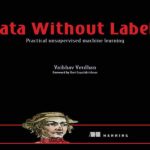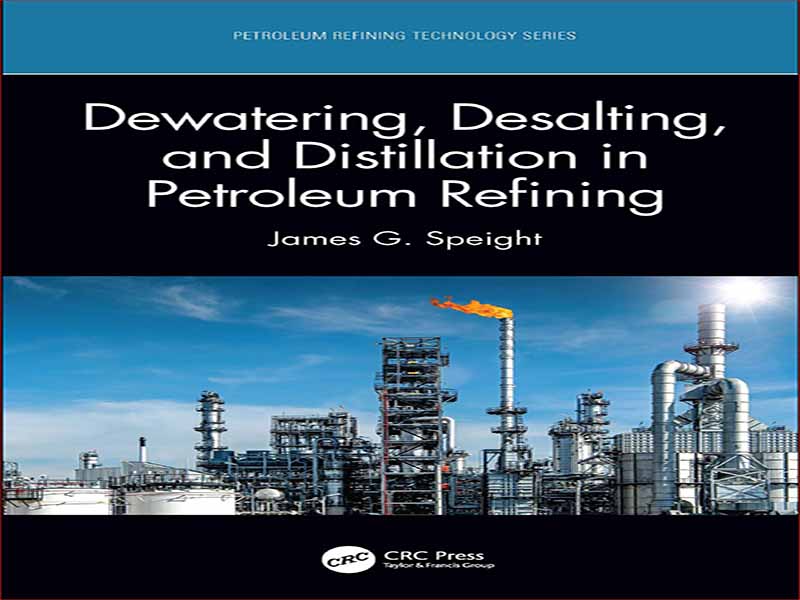- عنوان کتاب: Dewatering, Desalting, and Distillation in Petroleum Refining
- نویسنده: James-G-Speight
- حوزه: پالایش نفت
- سال انتشار: 2022
- تعداد صفحه: 271
- زبان اصلی: انگلیسی
- نوع فایل: pdf
- حجم فایل: 5.60 مگابایت
این کتاب به عنوان دومین کتاب از مجموعه پالایشگاه ها، شرحی از فرآیندهای مختلف آبگیری، نمک زدایی و تقطیر را ارائه می دهد که خوراک پالایشگاه را برای فرآیندهای مختلف تبدیلی که منجر به تولید محصولات با درجه مشخصات می شود، آماده می کند. نفت خام وارد شده به پالایشگاه برای هر شکلی از فرآوری حاوی ناخالصی های نامطلوب زیادی مانند ماسه، نمک های معدنی، گل حفاری، پلیمر و فرآورده های فرعی خوردگی است. هدف از آبگیری و نمک زدایی نفت خام، حذف این ناخالصی های نامطلوب به ویژه املاح و آب از نفت خام قبل از تقطیر است. در طی این فرآوری، مراحلی برای حذف ناخالصی های اولئوفوبیک ضروری است و معمولاً به دو صورت (1) جداسازی مزرعه و (2) آبگیری و نمک زدایی رخ می دهد. جداسازی میدانی پس از تولید نفت خام از مخزن اولین مرحله است که در آن گازها حذف می شوند و آب و خاک همراه نفت خام که از زمین می آید و در میدان نزدیک محل چاه ها قرار می گیرد. اولین فرآیندها (نمک زدایی و آبگیری) بر پاکسازی مواد اولیه، به ویژه حذف مواد تشکیل دهنده مزاحم آب نمک متمرکز است. به دنبال آن تقطیر برای حذف ترکیبات فرار با تولید همزمان باقیمانده ای انجام می شود که می تواند به عنوان ماده اولیه ترک خوردگی (کک کردن) یا به عنوان پیش ساز آسفالت استفاده شود. سایر روشهای تصفیه مواد اولیه که مفهوم فراریت را در بر میگیرند نیز در اینجا گنجانده شدهاند، حتی اگر برخی از روشها (مانند جداسازی و اجرای مجدد) نیز برای خالصسازی محصول مورد استفاده قرار گیرند. با این حال، مرحله تقطیر اخیراً به عنوان یک مرحله قابل دوام شناخته شده است که بخشهای باارزش با جوش بالا برای قیر تولید میکند. این کتاب برای پرداختن به فرآیندهای مربوط به پاکسازی (آب زدایی و نمک زدایی) نفت خام و جنبه های مختلف تقطیر که منجر به تولید محصولات فله می شود که برای پالایش بیشتر برای تولید محصولات قابل فروش ارسال می شوند، طراحی شده است.
As the second book of the refinery series, this book presents a description of various dewatering, desalting, and distillation processes that prepare the refinery feedstocks for various conversion processes that lead to the production of specification grade products. Crude oil introduced to a refinery for any form of processing contains many undesirable impurities, such as sand, inorganic salts, drilling mud, polymer, and corrosion byproduct. The purpose of crude oil dewatering and desalting is to remove these undesirable impurities, especially salts and water, from the crude oil prior to distillation. During this processing, steps are necessary to remove the oleophobic impurities and typically they occur in two ways which are (1) field separation and (2) dewatering and desalting. Field separation after the crude oil is produced from the reservoir is the first step in which gases are removed and the water and dirt that accompany crude oil coming from the ground and are located in the field near the site of the wells. The first processes (desalting and dewatering) are focused on the cleanup of the feedstock, particularly the removal of the troublesome brine constituents. This is followed by distillation to remove the volatile constituents with the concurrent production of a residuum that can be used as a cracking (coking) feedstock or as a precursor to asphalt. Other methods of feedstock treatment that involve the concept of volatility are also included here even though some of the methods (such as stripping and rerunning) might also be used for product purification. However, the distillation step has recently been recognized as a viable step that produces additional valuable high-boiling fractions for the bitumen. The book is designed to address the processes involved in the cleanup (dewatering and desalting) of crude oil and various aspects of distillation leading to the production of bulk products that are sent for further refining to produce saleable products.
این کتاب را میتوانید بصورت رایگان از لینک زیر دانلود نمایید.
Download: Dewatering, Desalting, and Distillation in Petroleum Refining




































نظرات کاربران